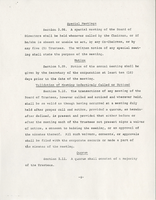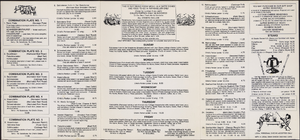Search the Special Collections and Archives Portal
Search Results
Charles Seals oral history interview
Identifier
Abstract
Oral history interview with Charles Seals conducted by Claytee D. White on July 14, 2017 for the African Americans in Las Vegas: a Collaborative Oral History Project. In this interview, Seals discusses his upbringing in Las Vegas, Nevada and growing up on the Westside. He recalls attending Madison Elementary School, being involved in church activities, and his initial interests in religious ministry. Seals talks about working in the funeral industry, and starting a church in the mid-1980s. Seals recalls the African American church leaders in the Westside and other community leaders at the time. He describes businesses on Jackson Street and recreational activities he participated in. Later, Seals discusses his mother, Rosie Seals, and her involvement in the Welfare Rights movement, being a founding member of the Clark County Welfare Rights Organization (CCWRO), and starting Operation Life. Lastly, Seals talks about the issue of substance abuse, organized crime, and the lack of financial investment into the Westside.
Archival Collection
Luceanne "Lucy" Taufa oral history interview
Identifier
Abstract
Oral history interview with Luceanne "Lucy" Taufa conducted by Jerwin Tiu, Cecilia Winchell, and Stefani Evans on December 16, 2022 for Reflections: the Las Vegas Asian American and Pacific Islander Oral History Project. In this interview, Taufa describes growing up on the Tongan island of Vava'u in a large family and later immigrating to the United States. She recalls her father first immigrating to Hawaii, and after obtaining a green card, her and her siblings following shortly after. While Kaufa's older siblings continued to pursue higher education and her younger siblings were too young to work, she took on a bulk of the responsibility to provide income and navigate life in Hawaii for her family. Eventually, Lucy moved to Dallas, Texas, met her husband, and moved to Las Vegas, Nevada for her husband's job. Later in the interview, she discusses joining the Culinary Union after experiencing racial discrimination at her workplace and her pride in her identity as a Tongan woman.
Archival Collection

Angela Castro oral history interview: transcript
Date
Archival Collection
Description
Oral history interview with Angela Castro conducted by Stefani Evans, Cecilia Winchell, Kristel Peralta, Vanessa Concepcion, and Ayrton Yamaguchi on November 05, 2020 for the Reflections: The Las Vegas Asian American and Pacific Islander Oral History Project. Castro begins the interview by talking about her early life, childhood, what Guam was like, and the history of her parents and grandparents. She describes the difference in public and private education in Guam and compares it to the United States. She explains the reason why she moved to Las Vegas, Nevada in 1998 and attended the University of Nevada, Las Vegas for public relations. Castro then talks about the differences between older and newer generations, the political atmosphere in Guam, and the differences between the United States and Guam in politics. She also talks about the discrimination she has experienced throughout her life and diversity in the workplace. Lastly, she describes her culture and traditions during holidays, the struggles with an absence of culture within her family, and her personal religious beliefs.
Text
Southern Nevada Daughters of the American Revolution Records
Identifier
Abstract
The Southern Nevada Daughters of the American Revolution Records primarily document the activities of three Southern Nevada chapters of the National Society Daughters of the American Revolution from 1950 to 2024. The materials center around the records of three chapters from Southern Nevada: Old Spanish Trail, Francisco Garces, and Valley of Fire. Materials include administrative records, scrapbooks, photographs, news clippings, and correspondence about the activities of the Daughters of the American Revolution chapters. Mateirals also include some records and scrapbooks from the Nevada State Society of DAR.
Archival Collection
Charles P. Squires Photograph Collection
Identifier
Abstract
The Squires Family Photographs document the Squires Family and the development of the Las Vegas Valley in Nevada from approximately 1860 to 1980, with a bulk of the photographs depicting people and events from 1900 to 1950. The photographs depict the Euro-American settlement and growth of Las Vegas, Nevada; traveling and exploration of Southern Nevada and the Southwestern United States; the Hoover (Boulder) Dam and the Colorado River; clubs and social groups; and the Squires Family, especially prominent newspaper editor and publisher Charles Pember (C. P. or “Pop”) Squires, Delphine “Mom” Anderson Squires, and their children.
Archival Collection
Southern Nevada Gem and Mineral Society Records
Identifier
Abstract
The Southern Nevada Gem and Mineral Society Records (1950-2024) contain the records of the Clark County Gem Collectors, Las Vegas Gem Collectors, and the current Southern Nevada Gem and Mineral Society. The collection contains articles of incorporation, by-laws, membership directories, meeting minutes, correspondence, financial records, show paperwork, and award certificates. Also included are photographs of the organizations since the 1970s and digital scans of Gem Times and The Polished Slab newsletters.
Archival Collection

By-laws of the Nathan Adelson Hospice, November 30, 1978
Date
Archival Collection
Description
The by-laws of the Nathan Adelson Hospice establish the purpose and organization of the program, founded in 1978 in Las Vegas.
Text
Wolff, Walter P., 1928-2016
http://www.ladailypost.com/content/obituary-walter-p-wolff-dec-29-2016
copied from resouce above
Person
Regional subject files, 1859, 1908, 1970-2015
Level of Description
Scope and Contents
The regional subject files include materials collected by anthropologist Katherine Spilde about Native American gaming, Native American communities in the United States, and the US and international gaming industries. The materials date from 1859 to 2015, with the bulk of materials dating from 1990 to 2010. Materials dating from the nineteenth and early twentieth centuries are a reproduction of a federal treaty and an ethnohistorical essay. The majority of the materials document Native American gaming following the passage of the 1988 Indian Gaming Regulatory Act. The papers include research and subject files created by Dr. Spilde during her employment with the National Gambling Impact Study Commission (NGISC), National Indian Gaming Association (NIGA), and Harvard Project on American Indian Economic Development (HPAIED). The materials document Native American gaming enterprises both on and off reservations, the socioeconomic impact of gaming, the political history of gaming in the US, and international gaming. The series includes socioeconomic reports, testimonies, correspondence, memos, press releases, photographs, audiovisual materials, promotional materials, brochures, fact sheets, summaries, booklets, pamphlets, advertisements, tourism materials, journal articles, legal briefs, legislative documents, court opinions, notes, presentations, conference materials, periodicals, community newspapers, and newspaper articles.
The collection contains documentation on a number of Native American nations, including the Misi-zaaga'iganiing Anishinaabeg (Minnesota Chippewa Tribe, Mille Lacs Band); Gaa-waabaabiganikaag Anishinaabeg (Minnesota Chippewa Tribe, White Earth Band); Forest County Bodéwadmi (Forest County Potawatomi Community); Ho-Chunk Nation of Wisconsin; Mashantucket Pequot Indian Tribe; Mohegan Tribe of Indians; Tulalip Tribes of Washington; Sisseton-Wahpeton Oyate of the Lake Traverse Reservation; Standing Rock Sioux Tribe of North and South Dakota; Mandan, Hidatsa, and Sahnish (Arikara) (Three Affiliated Tribes of the Fort Berthold Reservation, North Dakota); and Mississippi Band of Choctaw Indians. Other communities are also represented in the series, but to a lesser extent. In addition to materials about gaming and casinos, Dr. Spilde also collected documents, photographs, and audiovisual materials about Native American culture in general. The series documents regional and national trends in Native American gaming, and the greater gaming industry. Materials trace federal and state relationships with individual Native American nations, specifically concerning gaming enterprises.
Archival Collection
Collection Name: Katherine A. Spilde Papers on Native American Gaming
Box/Folder: N/A
Archival Component

